Opinion

There’s a lot going on thematically in Sorry to Bother You. Cash has to deal with the indignity of trading success for being his authentic self. As an artist, Detroit also struggles with selling out —she, too, has a “white voice,” but instead of selling a product, she’s using it to sell herself. The news media covering the RegalView strike is addicted to easily-repeated clips rather than the whole story, as when a protester who throws a can of cola at Cash becomes famous when the incident goes viral. Our willingness to laugh at rather than empathize with the struggles of others is also displayed through a popular game show called “I Got the S**t Kicked Out of Me,” where contestants get beaten up and dunked in excrement.
6. Twenty-foot-tall rice could feed a flooded planet
When Climate change floods regions around the world, deepwater rice could thrive while other species die.

The purpose of Lawyers and Collars is to equip and empower pastors and local church leaders to work alongside lawyers to protect vulnerable citizens at voting precincts. Together, we can provide a legal and moral presence against voter suppression, intimidation, and harassment that are expected to rise in the 2018 midterm elections. The campaign welcomes the involvement of imams, rabbis, and other faith leaders.

Are locked in detention as part of some plan,
May we be reminded that you love them, too;
They’re made in your image; they’re precious to you.

My years of healing have taught me that childhood sexual abuse creates terrible trauma that is stored in our bodies, hiding in the nooks and crannies of a life struggling to be “normal” and free of pain. I learned those truths because I was a victim of sexual abuse in what I believed to be a safe place, my faith community.

Ramirez: I think like what you said, it's taking the side of the broken, the beaten, and the defeated. It’s knowing that when you say, “You just gotta lift yourself up by the bootstraps,” that not everybody has boots to be lifted up by. Justice looks like that. It looks like taking the side of the one being accused, the one being pummeled, not even just today, but throughout history because there are whole people groups who have been pummeled. Justice looks like giving people a taste of a true Jesus. Jesus would go to the woman at the well even if all of culture said not to, even if people looked down on him, even if it might have been bad for his reputation, that’s what he did. So often we like to tell good stories and take pictures of refugees and orphans somewhere else, but we very much like to ignore the causes that we should be fighting for here. For me, that's what justice looks like.

As a listener in this space, I choose to sit with them no matter where they are sitting — in the dark or in the light. And maybe, not surprisingly, I have learned more from sitting in the darkness with them. We have all learned by dwelling there. God abides with us as we sit in the darkness. We do not sit alone. The creator of darkness s sits with us. We feel to the marrow of our bones God’s abiding presence. We also know that darkness does not have the final word — light does. . If we will but wait long enough, eventually the sun will come up and the darkness will end.

The decision to uphold President Donald Trump’s callous Muslim ban will be remembered in history alongside other cases where the highest court in the land failed deeply and shamefully to deliver justice, like Dred Scott when SCOTUS denied citizenship to anyone of African descent and Korematsu when SCOTUS upheld internment of Japanese Americans during WWII.
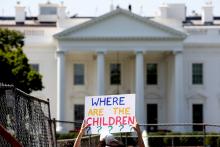
It is time for people of faith and conscience to demand nothing less than an immediate and complete reunification of separated families — and demonstrate our willingness to play a role in this process. We have spoken out to stop the separation, but we still have the moral imperative to fix it for those who have been torn from their parents. I have recently been in meetings with bipartisan groups of senators who want to see this issue fixed, who care very deeply about finding lasting solutions, and who are asking for the help of the faith community.
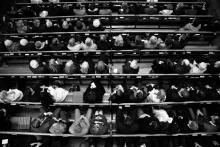
But once back in America, these very same Christians will adamantly oppose having “foreigners” as neighbors, loathing the idea that they could possibly be allowed to cross into the border of the United States seeking a better life. So while they post pictures on social media of themselves surrounded by poor children and holding babies they personally cared for, they’ll post nothing about the children and babies being separated from their parents at the border.

There’s always been a deep tension between those who believe the powerful words about freedom for all and those who believe that such freedom should be reserved to them alone. There have always been those who believe that their personal freedom is unbreakable but the freedom of others can be rationed.
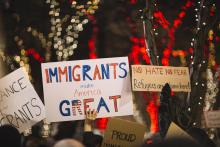
We in the church have clung too tightly to our country’s myths of exceptionalism. We’ve been too slow to name the real “terror within” and unwilling to listen to those telling us of terror all around. We’ve been reluctant to own up to our history and speak out against unjust policies . We don’t like to think or talk about it, but most of us know that our quality of life here comes directly at the expense of everyone else on the planet (not to mention the planet itself), millions of ordinary folks whose countries have been ravaged by centuries of colonialism and persistent neocolonial structures, who make our clothes and gadgets, grow our food and coffee, and pay in countless other ways for all our out-of-control consumption and addictions. Their problems are our problems. So we can’t set them aside.

Fortified with fruitcake, I went in search of some way to live as a contemplative amid the world’s madness. Over the next few years, I read about the mystical stream that runs through all of the world’s wisdom traditions, and experimented with several popular contemplative practices. But, with the exception of the Quaker meeting for worship, I couldn’t find a practice compatible with my temperament, religious inclinations, and life situation.

This is not a time for the marketplace of ideas. There are people who believe that immigrant children are criminals. There are people who act as though queer folks are an abomination. There are people who consider every black and brown person to be a threat. These ideas are not worth debating. Logical conversations will not dissuade oppressors. Civility has never transformed the reality of the marginalized and it never will.

Religious leaders must make a direct appeal to every person who plays a role: refuse to obey inhumane orders. When the order is to take children from the arms of their parents or to prevent traumatized children from seeking comfort in each other’s embrace, religious leaders must insist that workers tell their superiors that they will not comply.
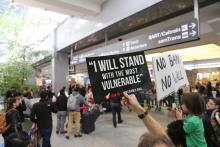
In a way, it's a cruel joke that the majority used yesterday's decision to officially overturn the Korematsu v. United States decision of 1944 that upheld the government's right to intern Japanese Americans in concentration camps. While this was a welcome and long-overdue step, it's also a way for the conservative majority to attempt to wash its hands, Pilate-like, of the consequences of asserting that current and future presidents have the power to keep members of a disfavored group out of the country if they simply massage the language of their executive orders and proclamations sufficiently. As Justice Sotomayor argued in her dissent, it "merely replaces one gravely wrong decision with another." It's a slippery slope that risks pointing us backwards towards our shameful past, in which the high court long upheld the constitutionality of slavery, Jim Crow laws, the Chinese Exclusion Act, many grievous harms to Native American people and communities, and other horrors, all of which we rightfully recognize today as counter to the principles of the Constitution and the tenets of Christian faith.
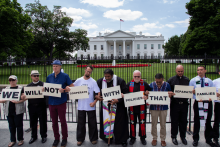
Sojourners is encouraging more communities of faith to hold vigils around the country. We are calling on clergy, faith-based organizations, and Christians everywhere to lift up prayers and candles as a recommitment to the light that can hold back these dark times.
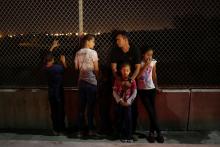
Many of Christianity’s tenets are inherently illogical and absurd — a person being fully man and fully God; a person rising from the dead; miracles (like being swallowed alive by a fish); angels and supernatural beings; an afterlife … If Christians can accept these things as true, the basic themes of the gospel: love, joy, peace, kindness, forgiveness, and hope can hardly be questioned. Yet many Christians are failing to abide by these fundamental truths, refusing to follow God’s greatest command. For people claiming the faith of Christ, showing love and compassion to immigrants, no matter their status, is a requirement of following Jesus — there is no alternative.

The current outrage around families being detained and separated is important, but we must bear in mind that it aligns with a national history. Our Native siblings had their land taken from them, their families wiped out so the U.S. could be “founded.” My own ancestors had their children ripped away from them during slavery sales. Our Japanese siblings were placed in armed internment camps during the second World War — a history that this nation has often tried to avoid as much as possible. Last year, we saw an attempt to block immigrants and refugees from primarily Muslim nations, commonly known as the “Muslim Ban.”

I do not know how to measure the efficacy of prayer. And I know that prayer is not all that’s needed to respond to the concerns of the day. But I also know that my response to the moment we’re living in will be more substantial, more focused and certain, if I tune out the distracting din and choose to attend to the world in prayer instead.